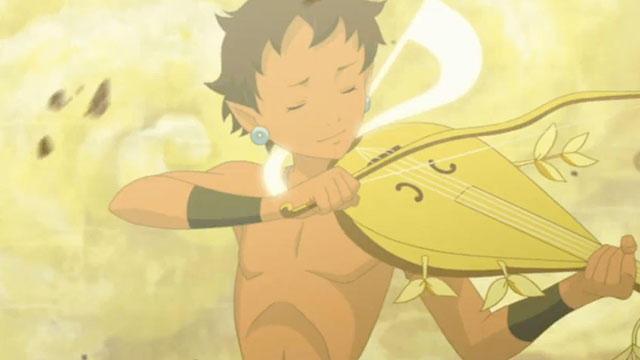There are 12 films featured in Genius Party and Genius Party Beyond, the twin omnibuses of short film put out by acclaimed Japanese production house Studio 4°c, but it is Gala that is the best representative of current anime’s multitude of approaches. The film delights in cramming the industry’s typical preoccupations with explosions, light, flight, transformation, music, history, and religion seemlessly into the plot; plus it presents the kind conceptual shift that turned so many stoned college kids onto anime here in North America over the years. This kitchen sink approach proves itself to be remarkably effective in the short form—if skillfully channeled—and director Mahiro Maeda, succeeds in turning Gala into a fun and trippy 14 minute exercise in wonder.
The film starts with a giant spherical object crashing down in what looks like a traditional village. Sci-fi in anime has imaged some of the more imaginative and graphic encounters between alien cultures, does this giant edifice represent a percursor to that? The villagers tentatively, yet fearlessly approach it, attempting to break through its bland, non-descript outer shell by throwing stones and lighting fires. A boy, our main character, feels a reverberation run through him—he feels a connection to this odd monument. While this feeling is ultimately consequential, before we are allowed to ponder that, we notice that things seem strange—why does the boy have a horn on the top of his head?
Upon further inspection other villagers seem odd too. They have horns as well, but not uniformly, and still others are blue or other fantastical colors. A little cultural knowledge in this case is helpful. Such horns in Japan are usually representative of “Oni” or demons of Buddhist lore, torturers of the denizens of Buddhist hell. On the other hand some villagers look like frogs and other animals, likely representing Japan’s traditional Shinto religious tradition, which posits the existence of numerous local gods, inhabiting and embodying the natural world. Indeed the female lead, dressed in her voluminous red and white outfit, is garbed the traditional clothing of a Shinto priestess. Once this is established it becomes a fun guessing game as many other world religions and traditions are represented in the village’s diverse membership. This pan-religious approach makes sense for the plot, as the village is swayed away from a stance of fear and violence towards the ‘Other’ in its midst, and into the joyful collective action of creating music, which peacefully entwines itself with the object in order to draw out the alien edifice’s ultimate potential.
The Genius Party project from which Gala comes is the newest and most ambitious of Studio 4°c’s, periodic short film collections, representing a truly high and diverse level of talent. Gala’s brethren in the collection range from Cowboy Bebop creator Shinichiro Watanabe’s well-crafted but stylistically conventional Baby Blue, to the daringly experimental approach of Shinya Ohira’s Wanwa the Puppy. Gala falls somewhere in the middle of the two, though perhaps a bit closer to the conventional. Director Mahiro Maeda after all is not a radical auteur, but an experienced veteran of the anime industry having directed or worked on several landmark projects over the years, including Blue Submarine no.6, Neon Genesis Evangelion and Vision of Escaflowne. Stateside though he is likely most acclaimed for his contributions to the Animatrix collection, having directed Second Renaissance Parts 1 and 2. Anime-critic Ben Ettinger remarks that Maeda’s work is shaped by a strong intellectual curiosity, and Gala certainly upholds that generalization. In his review, Ben notes some fascinating aspects about the interplay of the animation and the music, which certainly suggests a rigor and attention to detail which is laudable.
The large commercial market for animation in Japan ironically has stunted short animations which still thrive primarily at festivals. Thus the Genius Party films are a truly rare treat to see the diversity of anime and what some of its key innovators can get up to when given true artistic freedom. Neither of the two collections however are available in the US, and with the steady disintegration of the local anime dvd market, it is unlikely that they ever will be. That said seek them out whether through import or digital. You will be happy you did.
Edit: 12/18/2010 : Link has been taken down due to copyright claim by Studio 4°c.

 Jason Sondhi
Jason Sondhi